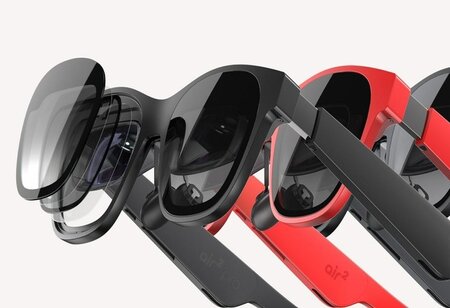XReal Unveils Air 2 Ultra: Affordable AR Glasses to Rival Apple's Vision Pro
By Consultants Review Team
 Chinese startup XReal is set to shake up the augmented reality (AR) market with its latest offering, the Air 2 Ultra. Priced at a starting pre-order cost of $699, these AR glasses are positioned as a budget-friendly alternative to Apple's Vision Pro, retailing at a significantly higher starting price of $3,499. XReal's CEO, Chi Xu, asserts that their focus is on making advanced wearable 6DoF glasses accessible to a broader audience within the XR development ecosystem, differentiating themselves from competitors like Apple and Meta.
Chinese startup XReal is set to shake up the augmented reality (AR) market with its latest offering, the Air 2 Ultra. Priced at a starting pre-order cost of $699, these AR glasses are positioned as a budget-friendly alternative to Apple's Vision Pro, retailing at a significantly higher starting price of $3,499. XReal's CEO, Chi Xu, asserts that their focus is on making advanced wearable 6DoF glasses accessible to a broader audience within the XR development ecosystem, differentiating themselves from competitors like Apple and Meta.
The Air 2 Ultra projects a virtual screen onto the user's field of vision, displaying notifications and videos seamlessly integrated with the physical surroundings. XReal emphasizes the device's suitability for extended wear, challenging the perception of AR glasses as niche or cumbersome. The startup aims to capitalize on the affordability factor, positioning itself as an attractive option in the market.
While the Air 2 Ultra is expected to compete with Meta Quest 3, which starts at $499, Xu believes that the device's real potential lies in its ability to surpass XReal's previous models in sales. Despite their older, more budget-friendly AI glasses being deemed "easier to sell" and enjoying popularity on platforms like Amazon, Xu anticipates the Air 2 Ultra, with a projected production of 50,000 units this year, to be the company's primary revenue driver in the future.
To bolster its position in the competitive AR market, XReal is reportedly set to secure an additional $60 million in funding from an undisclosed supply chain partner. This funding is expected to contribute to scaling up manufacturing capabilities and advancing research and development. With this infusion, XReal anticipates doubling its production capacity within the next two years.
In terms of market share, XReal has already made significant strides, commanding nearly half of the AR device market in the third quarter of the previous year, according to data from research firm IDC. Xu asserts that while Apple is catching up, XReal is currently three to five years ahead in AR capabilities. Despite forgoing a fully immersive virtual reality feature, XReal's emphasis on AR positions it as a key player in the evolving landscape, prompting the need for tech giants like Apple to match their pace and innovation in the AR domain.




